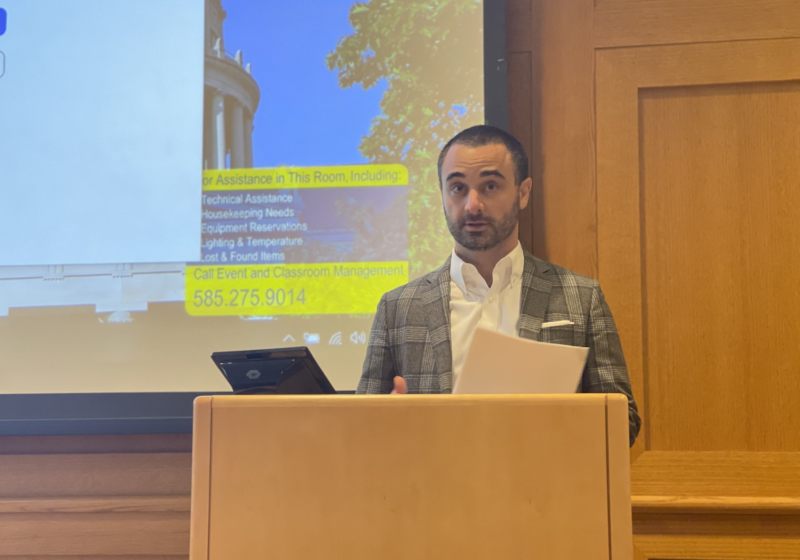Dr. Lyle Jeremy Rubin ‘20, a PhD alum and former marine, visited the Humanities Center last Tuesday to discuss his new book, “Pain is Weakness Leaving the Body,” detailing his experiences during the Afghanistan War.
Both faculty and students attended the talk, which lasted for about an hour and a half. The event was organized by Tanya Bakhmetyeva, associate academic director of the Susan B. Anthony Institute for Gender, Sexuality, and Women’s Studies.
After an introduction by Bakhmetyeva, Rubin started off by saying that the talk wouldn’t be academic and that the book involved many rough topics.
“I write about imperialism, and violence, and masculinity, and a lot of horrible things,” Rubin said. “It’s kind of hard to avoid sensitive subject matter.”
Rubin expressed that he would not be offended if anyone felt the need to leave the room and asked the audience to bear with him as he read three excerpts from the book, each taking place at a different stage in his life. The passages explored the intersections between a range of different topics, including mass shooters and their proximity to the military, how the wealthiest counties in the United States profit from war, and how repressed anger affected him and his fellow marines.
After Rubin finished reading, the audience gave a round of applause and he opened up the floor for questions.
One audience member asked about how the childhood memories and sexual experiences Rubin wrote about in the first chapter influenced him in his creation of the book.
Rubin replied that he initially had no intention of mentioning his childhood in the book. However, his childhood, in particular the sexual and gendered elements of it, became front and center when he actually sat down to write it.
Rubin said that the writing process forced him to realize he was a very insecure kid and that he had been sexually bullied and violated during his childhood.
“I actually came to believe that one of the reasons […] that so many aspiring men end up being so violent […] is because of these experiences that they aren’t able to talk about, and because of a society that discourages them from talking about these things,” he said.
Rubin explained that it was important for him to use these experiences to talk about the broader themes of masculinity, aggression, and insecurity in the rest of the book.
Another audience member asked Rubin about the hierarchy and class divide within the marines. Rubin responded by saying that the resentment felt by lower-ranking marines, who often come from lower class backgrounds, against upper-class, high-ranking officials is often used by the military to maintain the status quo.
“Enlisted guys, a lot of times they do not have the ability to punch out their officer. […] They do have the possibility to aim […] at a complete stranger 300 or 600 yards away,” Rubin said.
Rubin began writing “Pain is Weakness Leaving the Body” alongside his PhD dissertation in 2020. It was published on Nov. 1, 2022. When asked about his next move as an author, Rubin says he hopes to get his PhD dissertation on anti-capitalist readings of Adam Smith published as an academic text.






